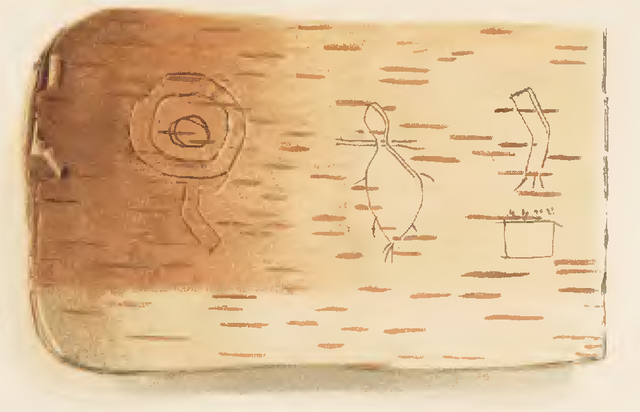A Brief Lesson in the Ojibwe Language
 Ojibwemowin is an indigenous language spoken by the Anishinaabe, or Ojibwe people. (Ojibwe tribes are also often referred to as "Ojibwa," "Ojibway," or "Chippewa.") Ojibwe tribes live in the Great Lakes region of the United States and Canada including Michigan, Wisconsin, Minnesota, North Dakota, Montana, Saskatchewan, Manitoba, Ontario, and Quebec. Because of the wide expanse of Ojibwe territory, there is not one single standard form of the language. Instead, there are related dialects that vary in sound, vocabulary, and grammar. The Ojibwe culture and language is traditionally oral, but some hieroglyphic images on birch bark teaching scrolls do exist. During the 1970s, a double-vowel alphabet and writing system were developed. The Ojibwe alphabet consists of 23 letters: a, aa, b, c, d, e, g, h, ', i, ii, j, k, m, n, o, oo, p, s, t, w, y, z And seven vowels that sound different than their English counterparts: a as in "about" aa as in "father" e as in "café" i as in "pin" ii as in "seen" o as in "obey" or "book" oo as in "boot" or "boat" Let's look at some words about animals, or "awesiiyag," common to Wisconsin: deer: waawaashkeshi (waah-waah-shkay-shee) bear: makwa (mah-kwuh) wolf: ma'iingan (mah-ing-gun) fox: waagosh (waa-gush) squirrel: ajidamoo (uh-jih-duh-moo) rabbit: waabooz (waa-boose) bird: bineshiinh (bih-nay-shee) snake: ginebig (gih-nay-big) This is just a small amount of insight into Ojibwemowin, a language with limitless possibilities.... In 1992, the Guinness Book of World Records listed Ojibwemowin as one of the "most complex" languages in the world. Today, the Ojibwe language is considered "endangered" due to the declining numbers of fluent speakers. Language revitalization programs are becoming more common throughout Ojibwe country as fluent speakers are recorded, immersion programs are developed, and teachers work with children and adults in schools and language tables on a regular basis to promote Ojibwemowin, the heart and soul of Ojibwe culture and heritage. If you are looking to learn more about the Ojibwe language, check out some of these resources: • A Concise Dictionary of Minnesota Ojibwe • Ojibwewi-Ikidowin: An Ojibwe Word Resource Book • Living Our Language: Ojibwe Tales and Oral Histories • Ojibwemowin: The Ojibwe Oral Tradition, Language (DVD) Submitted by Hayley @ Central
Ojibwemowin is an indigenous language spoken by the Anishinaabe, or Ojibwe people. (Ojibwe tribes are also often referred to as "Ojibwa," "Ojibway," or "Chippewa.") Ojibwe tribes live in the Great Lakes region of the United States and Canada including Michigan, Wisconsin, Minnesota, North Dakota, Montana, Saskatchewan, Manitoba, Ontario, and Quebec. Because of the wide expanse of Ojibwe territory, there is not one single standard form of the language. Instead, there are related dialects that vary in sound, vocabulary, and grammar. The Ojibwe culture and language is traditionally oral, but some hieroglyphic images on birch bark teaching scrolls do exist. During the 1970s, a double-vowel alphabet and writing system were developed. The Ojibwe alphabet consists of 23 letters: a, aa, b, c, d, e, g, h, ', i, ii, j, k, m, n, o, oo, p, s, t, w, y, z And seven vowels that sound different than their English counterparts: a as in "about" aa as in "father" e as in "café" i as in "pin" ii as in "seen" o as in "obey" or "book" oo as in "boot" or "boat" Let's look at some words about animals, or "awesiiyag," common to Wisconsin: deer: waawaashkeshi (waah-waah-shkay-shee) bear: makwa (mah-kwuh) wolf: ma'iingan (mah-ing-gun) fox: waagosh (waa-gush) squirrel: ajidamoo (uh-jih-duh-moo) rabbit: waabooz (waa-boose) bird: bineshiinh (bih-nay-shee) snake: ginebig (gih-nay-big) This is just a small amount of insight into Ojibwemowin, a language with limitless possibilities.... In 1992, the Guinness Book of World Records listed Ojibwemowin as one of the "most complex" languages in the world. Today, the Ojibwe language is considered "endangered" due to the declining numbers of fluent speakers. Language revitalization programs are becoming more common throughout Ojibwe country as fluent speakers are recorded, immersion programs are developed, and teachers work with children and adults in schools and language tables on a regular basis to promote Ojibwemowin, the heart and soul of Ojibwe culture and heritage. If you are looking to learn more about the Ojibwe language, check out some of these resources: • A Concise Dictionary of Minnesota Ojibwe • Ojibwewi-Ikidowin: An Ojibwe Word Resource Book • Living Our Language: Ojibwe Tales and Oral Histories • Ojibwemowin: The Ojibwe Oral Tradition, Language (DVD) Submitted by Hayley @ Central
